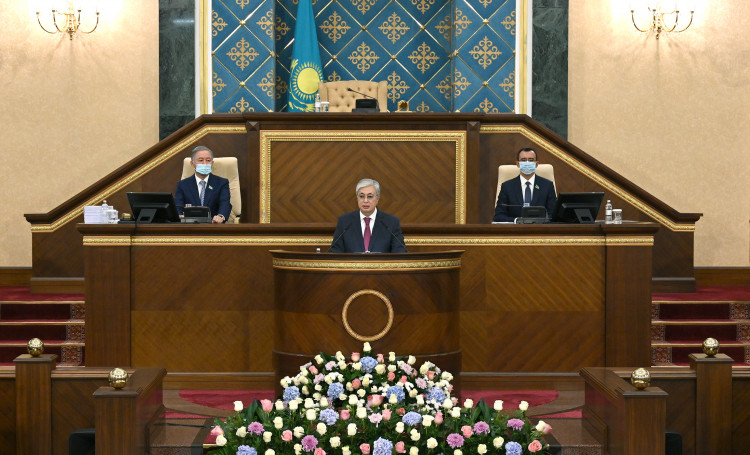 Developing nuclear energy, boosting the country’s military capacity, extending support for businesses and five new social initiatives were among the topics that Kazakhstan President Kassym-Jomart Tokayev raised during his 90-minute state-of-the-nation address on September 1, 2021.
Developing nuclear energy, boosting the country’s military capacity, extending support for businesses and five new social initiatives were among the topics that Kazakhstan President Kassym-Jomart Tokayev raised during his 90-minute state-of-the-nation address on September 1, 2021.
It was his third address to the nation since he become president in 2019.
All the initiatives voiced in the address were aimed at supporting the country in the post-pandemic period, improving the efficiency of the health care systems, ensuring quality education, improving regional policy and creating an effective ecosystem in the labour market.
“It seems to me that everyone who doubts the head of the state, who fails to do their job, who wants to sit and do nothing, should resign from their posts. We are now entering a decisive stage in our development. The state apparatus must work as a single mechanism. Only then will we be able to achieve our objectives,” said Mr Tokayev.
Social Initiatives
The social sector is a priority for Kazakhstan. Nearly half of the country’s budget for 2022-2025 will be allocated to it.
In his address to the nation, Mr Tokayev announced five social initiatives.
The minimum wage will be increased from the current 42,500 tenge (US$100) to 60,000 tenge (US$140) starting from January 1 next year. This is expected to impact more than one million people.
The minimum wage was not changed since 2018.
“I believe it is time to review the level of the minimum wage. On the one hand, it is the most important macro-indicator and on the other it is an indicator that everyone can understand,” said Mr Tokayev.
He added that experts project it will increase the gross domestic product by 1.5 per cent. He also cautioned the government to rely less on the minimum wage levels when making calculations in tax and social spheres.
Mr Tokayev also spoke about the need to increase the wage fund. Over the past 10 years, it has been 60 per cent lower than the profits of business owners. The government will develop measures to motivate businesses to increase the salaries of their employees.
Decreasing the burden on the payroll is another initiative.
“Micro and small businesses are particularly affected by this. I propose to introduce a single payment from the payroll with a reduction of the total burden from 34 per cent to 25 per cent. This will stimulate businesses to bring thousands of employees out of the shadows and make them participants in the pension, social security and health insurance systems,” said the president.
The government will also continue to increse the salaries of people working in sectors financed from the budget, such employees of cultural institutions, archives and libraries. From 2022 to 2025, the state will increase the salaries of nearly 600,000 people working in these fields by 20 per cent annually on average.
In 2020, the government increased the salaries of doctors, social workers and teachers.
It will also allow the transfer of a part of pension savings to the Otbasy bank for subsequent housing needs. This is a continuation of the 2020 initiative that allowed citizens to withdraw part of their pension savings for housing needs.
Development of nuclear energy
Kazakhstan may face an energy shortage by 2050, according to Mr Tokayev, and the country needs to start thinking of alternative reliable energy sources. Peaceful nuclear energy might be one of them.
“Within a year, the government and the Samruk Kazyna National Wealth Fund should study the possibility of developing a safe and environmentally-friendly nuclear power industry in Kazakhstan. It should also include the development of engineering and creating a new generation of qualified nuclear engineers in our country. Hydrogen energy as a whole is also a promising sector,” said Mr Tokayev.
Kazakhstan has been making significant progress as it tries to transition to a green energy and economy. It has committed to achieving carbon neutrality by 2060 and bringing the share of renewable energy in the total energy balance to 15 per cent by 2050, among other national targets.
Situation in Afghanistan
The escalating situation in Afghanistan and the country’s takeover by the Taliban group have been in global headlines over the past month. Though Kazakhstan and Afghanistan do not have a border, the situation still affects the region.
Mr Tokayev emphasised the need to enhance Kazakhstan’s capacity to respond to external threats and strengthen defence capabilities.
“We must prepare for external shocks and worst-case scenarios. Modelling external risks has become highly relevant. Stress tests should be conducted and scenarios should be worked out that will determine further actions of the state apparatus,” he said.
Independence – the highest value of the nation
As Kazakhstan celebrates the 30th anniversary of its independence this year, Mr Tokayev described independence as the highest value of the nation.
“In unity and harmony, we were able to build a new state – this is our greatest achievement. We have strengthened the spirit of the nation, laying a solid foundation for development. Together, we are building a strong state. Sovereignty is not an empty slogan or a loud word. The most important thing is that every citizen should feel the fruits of independence – a peaceful life, social harmony, increased prosperity of the people and the confidence of young people in their future. All our initiatives are aimed at this,” said Mr Tokayev.
“This year we are marking the 30th anniversary of our Independence – this is our most cherished treasure. Thanks to the forward-looking policy of the First President, Kazakhstan has had notable success and became known all over the world. In unity and harmony, we were able to build a new state: this is our greatest accomplishment. We have strengthened the spirit of the nation by laying a solid foundation for development. We have become an influential member of the global community. Thanks to the stability in our society, we have embarked on the path of sustainable progress.”
The annual address of the head of state is meant to serve as an impetus to induce action, according to Director of Kazakhstan Institute for Strategic Studies (KazISS) Zarema Shaukenova.
“The speech outlines a large layer of tasks related to our need to be prepared for external shocks. The head of state spoke about the challenges that we should be considering in solving the strategic tasks related to the development of our country,” she said.
Ms Shaukenova feels that it is necessary to develop methods of counteracting those global processes and trends that pose various kinds of threats to the economic, political, social stability and sustainable development of the country.
“We are now entering a decisive stage in our development. The government should operate as a single unit. In this way we can ensure the achievement of the goals,” added Ms Shaukenova.
Political expert Eduard Poletaev noted that the address has a special place in the history of the country since it has a direct impact not only on the authorities but also on each person.
“The objective of the state’s social policy is to improve the health of the nation, to provide financial support in some situations and to create confidence for the population in its economic future. This objective is reflected in the message and will be implemented,” Mr Poletaev wrote on his Facebook.
The expert believes that proposals concerning the specific socio-economic interests of the people help to ensure their continued political involvement. People are able to better comprehend the ongoing reforms with the help of the president’s address and then they start supporting the proposed measures of the government.![]()












